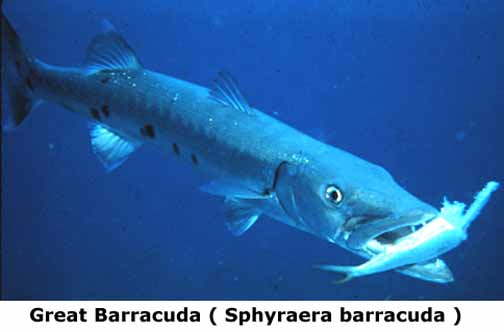
Due to global warming the coral reefs are dying, thus barracuda don't have enough food and have turned cannibalistic. Eating barracuda can result in rare or unknown diseases which effect the stomach, upper GI tract, blood, and even your gums. True story.
Monday, October 29, 2007
Don't eat barracudas
Posted by
TheGreyGhost
at
6:21 PM
![]()
Subscribe to:
Post Comments (Atom)
6 comments:
We need to love the planet and the barracuda´s way way more! If we open our hearts we will see that when we hurt our planet or our fellow animals, we hurt ourselves.
The ego is selfish and don´t care of anything else than instant gratification, and will keep on destroying to get what it needs. I pray that the love in our hearts will survive, because then the planet will heal. Love wants nothing else than love.
Hey, Grey, thank you for bringing up the barracudas situation - you are indeed not Grey! ;)
Nobody listens to or cares about your idiotic ideology.
You should get your facts straight. They have always been cannibals as most fish are. Sophia, is a bogger eating moron, that will make you sick.
"Almost all fish are cannibals," said Prof. H.J. Rice, before the New-York Association for the Protection of Game, at Pinard's last evening, "in the sense that they eat each other and their own young.
Your main deterrent from barracuda meat should be high concentrations of the ciguatera toxin which accumulates in predatory fish who feed on smaller species infected with it. The highest and therefore most dangerous concentrations of the toxin are seen in fish towards the top of the food chain such as giant trevally and barracuda.
~~~~~~~~~~~><(((*> <-------~~~~~~
In south east Florida you have an almost non existent chance of getting Ciguatera poisoning. You have a much greater chance of getting Ciguatera poisoning from eating a grouper, hogfish or cubera snapper than you do from Barracuda. That said the incidence of getting Cigutera from fish taken off the SE Coast of FL is almost non existent.
Post a Comment